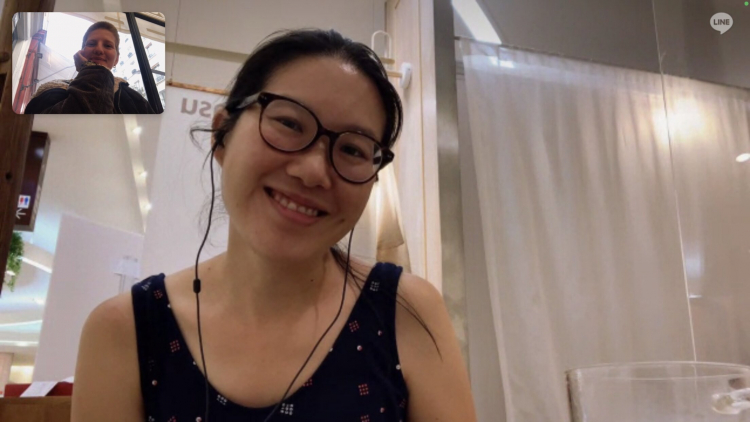College, Careers, and Changing Your Mind: An Interview with Michelle Kuo

"I think when I was very little I wanted to be a doctor," said Michelle Kuo when asked about her dream job as a child. She is smiling at the camera, sitting at a cafe in Taiwan, and drinking tea.
Michelle Kuo is a teacher, a writer, a lawyer, and an advocate. Students might know her as an Associate Professor for History, Law, and Society at AUP, others might have heard about her book, "Reading With Patrick." The daughter of Taiwanese immigrants, Kuo was born in Kalamazoo, Michigan where she attended public school until graduating from high school. In 2004, she graduated Harvard College with a degree in Social Studies and Gender Studies.
"First I wanted to be an English major," said Kuo when asked about her choice of study. "Then I changed to Gender Studies, then I added Social Studies to Gender Studies, but I was taking English classes on the side. College was a very free spirited time in my life where I was only going to do things I’m interested in, I was only going to do things that broaden me."
Kuo describes her personal heroes as being American Civil Rights heroes, and that it is them that influenced her plan for the future. "I don't know if I had a specific job in mind, I just wanted to be a part of social change, I wanted to be useful," said Kuo. "Even as I changed my professions, I think the desire to feel useful, to be a part of something larger than myself, is a constant."
This idea is visible in her actions. The topic of her senior thesis was Women's Rights Movements in China. She had also spent summers abroad, for example in Beijing, and volunteered at a student-run homeless shelter in Boston. After graduating from Harvard College, Kuo joined Teach for America, a nonprofit which recruits college graduates to fight educational inequity and provides marginalized children throughout the United States with the opportunity of an education.
"I went through so many changes in my twenties alone, so after college, I realized that I didn’t actually want to be abroad working on these Human Rights Movements when there’s so much disenfranchisement of the poor in the country where I lived, in the United States."
Through Teach for America, Kuo moved to Helena, a town in rural Arkansas, where she taught English at an alternative school. She later returned as a tutor in Arkansas county jail. Her 2017 book, Reading With Patrick, narrates this time in her life, the things she learned and emphasizes the power of education and reading.
Image credit: Leigh LucaßenWhen asked if one interest, or one job, profited from the other, Kuo agreed wholeheartedly. In teaching English, Kuo felt connected to her love for literature, which in turn helped her connect to her students. "The most primal way in which literature fed my career as a teacher in rural Arkansas was that literature gives you a way to connect to other people," she said. "You disagree, you joke, you agree about which character is taking advantage of another character, you fall in love with a character together. Even in your agreement or disagreement and in debates, you show a part of yourself that is your inner life. That inner life sometimes doesn’t get portrayed in more sociological or legal conversations about injustice. They tend to present the suffering person as a miserable person without inner desires or aesthetic tastes or even a sense of humor."
After leaving Helena, Arkansas, Kuo went to Harvard Law School. During her time at Harvard, she worked as a student attorney at the Criminal Justice Institute and the Education Law Clinic/Trauma Policy Learning Initiative, among others. She also clerked at The Door and the NAACP Legal Defense Fund.
After graduation, she continued her work on social change as an immigrants rights lawyer at the Centro Legal de la Raza, located in Oakland, where she worked with tenants facing evictions or families threatened with deportation. Similarly, she worked with RAICES to prepare detained asylum applicants for interviews with asylum officers.
Kuo also continued her work as an educator, teaching courses at San Quentin State Prison through the Prison University Program, before she went on to become an Associate Professor at The American University of Paris. She is currently a visiting professor at National Taiwan University. Nonetheless, Kuo continues her work with incarcerated people through the Stanford Three Strikes Program and she recently co-created the non-profit Dialogue & Transformation, alongside Hannah Taieb.
When asked if she believes that there is sacrifice involved in choosing your path, she neither agreed nor disagreed. "There are always sacrifices, but it is possible to create a balance in which your different interests nourish you."
Kuo also considered very carefully, whether life plans are necessary or not. She contends that a five-year plan might help some while it may simultaneously limit others. "If you do need a plan, be open to the plan changing. Because life does come around. There are so many different ways to find meaning wherever you are, even in situations that weren’t your intended plan," she said.
"It’s not unreasonable that students are experiencing some anxiety. On the other hand, you don’t need to act like you are fifty years old. The whole purpose of your twenties is to discover what you like. You can change your careers many times. And if you are interested in social change, for example, there are so many ways to get involved."








